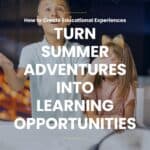Real-World Learning: 10 Simple Ways to Turn Summer Adventures into Educational Experiences
Discover 10 easy ways to turn summer fun into meaningful educational experiences. Learn how to use everyday adventures to foster curiosity, creativity, and real-world learning—no worksheets required.

Play. Learn. Thrive.™ only endorses products we authentically love and use. Some of the product links in this post may be affiliate links. That means that if you click them and make a purchase, this site makes a commission. Play. Learn. Thrive.™ is also an Amazon Associate. As an Amazon Associate, we earn from qualifying purchases. It will have no impact on the price you pay or the experience of your purchase.
Summer is a season of exploration, discovery, and unstructured play—an ideal time for real-world learning. Children are naturally curious, and with a little intentionality, summer adventures can become rich educational experiences. You don’t need workbooks or formal lessons—just a mindset that values everyday experiences as opportunities for growth.
Here are ten simple ways to transform your child’s summer adventures into meaningful learning moments.

Before we dive in, here’s a little about me so you know you’re getting advice from someone who’s been in the trenches! I’m Alanna Gallo, a former teacher with a master’s in education who saw firsthand how kids were losing confidence, independence, and their natural love of learning. I left the classroom to help parents raise curious, capable, and screen-conscious kids in a world that doesn’t make it easy. My work has been featured in major media outlets, and I’m here to give you real, research-backed advice—without the guilt trips or unrealistic expectations.
10 Simple Ways to Turn Summer Adventures into Educational Experiences
1. Turn Travel into a Geography & Culture Lesson
Whether you’re taking a road trip, flying to a new destination, or exploring a nearby town, travel provides a hands-on way to learn about geography, history, and culture.
- Let your child help plan the trip by reading maps, estimating travel times, or researching landmarks.
- Visit historical sites and encourage your child to ask questions about the people who lived there.
- Sample local foods and learn about their origins, sparking discussions about different cultures.
2. Make Nature Your Science Classroom
The outdoors offers limitless opportunities for hands-on science learning. Whether you’re hiking, camping, or just spending time in your backyard, encourage curiosity and observation.
- Identify plants, insects, and wildlife, using field guides or apps.
- Observe cloud formations and discuss weather patterns.
- Study the phases of the moon during evening adventures.
- Start a nature journal where your child can record observations, draw pictures, and make predictions.

3. Encourage Entrepreneurship with a Summer Business
A lemonade stand, handmade craft sales, or a small gardening venture can teach kids real-world skills in math, communication, and problem-solving.
- Have them calculate costs and set prices.
- Encourage them to create a sign or marketing materials.
- Teach them about budgeting, profits, and reinvesting earnings.
4. Transform Beach Days into a STEM Experience
The beach is more than just a fun escape—it’s a place to explore physics, marine biology, and environmental science.
- Build sand structures and experiment with different designs to test stability.
- Study ocean tides and waves.
- Collect shells and research the creatures that once lived inside.
- Learn about water erosion and its impact on shorelines.
5. Use Cooking to Teach Math & Science
Cooking is a hands-on way to practice math, chemistry, and life skills.
- Let your child measure ingredients to practice fractions.
- Experiment with recipes to understand cause and effect (e.g., what happens if you forget baking powder?).
- Talk about the science of food—how yeast makes dough rise or why eggs solidify when cooked.
- Cook dishes from different cultures and discuss their history.
6. Create a DIY Engineering Lab with Fort-Building
Engineering doesn’t have to be complicated—fort-building is a great way to develop spatial awareness, problem-solving, and teamwork skills.
- Challenge your child to design a fort with available materials like blankets, sticks, or cardboard.
- Introduce the concept of structural stability by testing different designs.
- Add an extra challenge: Can they build a fort big enough for the whole family?
7. Turn Storytelling into a Language Arts Adventure
Summer is a great time to nurture a love of storytelling and literacy in fun, hands-on ways.
- Create a summer journal where your child documents their adventures through drawings and writing.
- Make up stories together, taking turns adding new plot twists.
- Read books related to upcoming trips or experiences to build excitement and background knowledge.
- Encourage them to record their own audiobook or create a comic strip based on their favorite summer memory.
8. Make Museums & Zoos Interactive Learning Experiences
Instead of simply walking through a museum or zoo, make it interactive.
- Have your child pick a topic they want to learn about before visiting and challenge them to find five new facts.
- Encourage sketching exhibits or animals they find interesting.
- Use storytelling to bring history to life—imagine what it was like to live during a certain time period or to be an animal in the wild.
- Visit the gift shop afterward and let them choose a book or educational souvenir related to something they learned.

9. Practice Money & Math Skills on Shopping Trips
Even a routine grocery store visit can be an opportunity to practice real-world math and budgeting.
- Give your child a small budget to spend on snacks for a picnic and help them compare prices.
- Let them weigh produce and estimate costs.
- Have them count change or calculate the total cost before checkout.
10. Cultivate Curiosity with Unstructured Free Play
Not all learning needs to be planned—sometimes, the best learning happens when kids are given space to explore, create, and follow their interests.
- Provide open-ended materials like blocks, loose parts, or craft supplies and see what they create.
- Encourage outdoor play where they can invent games, experiment, and problem-solve.
- Let boredom work its magic—kids often come up with their most creative ideas when given time to think and explore on their own.
🌍 Thinking about worldschooling but not sure where to start?
Our Worldschooling 101 e-book is your go-to guide for understanding what worldschooling really is, how to make it work for your family, and how to get started—whether you're planning a big trip or just exploring new ways to learn through travel.

✨ Packed with insight, encouragement, and practical tips, this e-book will help you feel confident stepping outside the traditional education box.
The Power of Everyday Learning for Educational Experiences
Real-world learning doesn’t require a curriculum or formal lesson plans—it’s about embracing everyday moments as opportunities for discovery. Whether you’re traveling, cooking, or simply playing outside, the experiences you share with your child this summer can spark curiosity, develop essential skills, and create lasting memories.
By shifting your mindset to see every adventure as a learning opportunity, you’ll be giving your child the greatest gift of all: a lifelong love of learning.
Inspired by this post? Be sure to subscribe download my free Screen-Free Starter Kit! For more insights and resources on raising confident, lifelong learners, be sure to follow me on Instagram – can't wait for you to join me!
If you enjoyed this article about creating educational experiences for the summer season, you may also want to check out:
The Summer Screen Reset: Why Your Child Needs a Minimal Screen Summer (and How to Make It Happen)
Summer Bucket List for Families Who Want More Connection & Less Distraction
Slow Summer: How to Say No to Over-Scheduling and Yes to a More Meaningful Season






